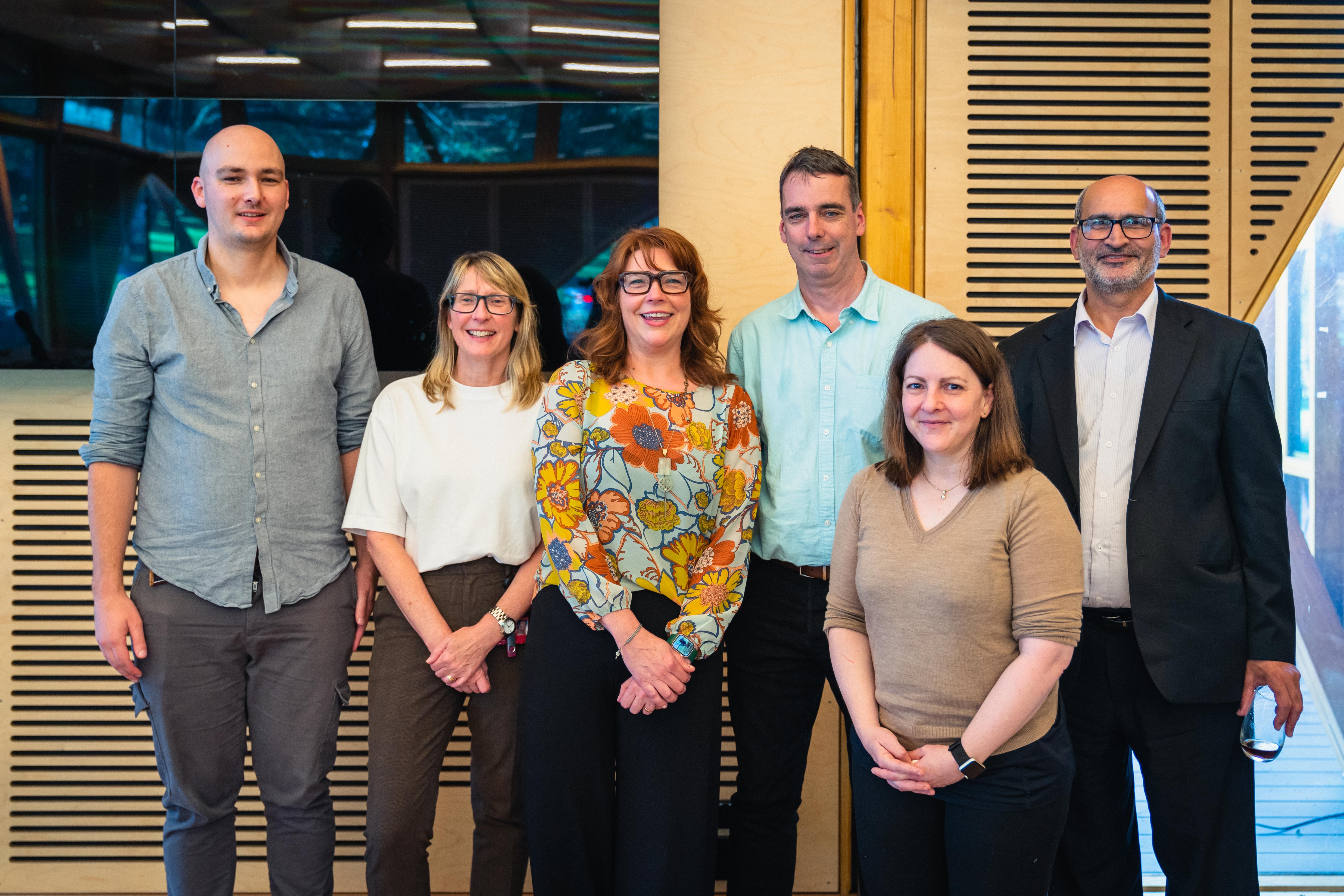Macquarie Researchers forge new paths to impact
By Jen Waters
From left to right: Dr Richard Savery, Department of Media, Communications, Creative Arts, Language and Literature, Dr Lucinda McRobb, Macquarie Medical School, Lara Moroko (Instructor on the Program), Professor Ray Laurence, Department of History and Archaeology, Wendy Lipworth, Department of Philosophy, Dr Dalbir Ahlawat, Department of Security Studies and Criminology.
Twelve exceptional researchers represent the latest cohort to graduate from the MQ Researchers IMPACT Program – a strategic collaboration between MQ Incubator and the Office of Commercialisation and Innovation supporting researchers to leverage their ideas for commercial impact.
The impressive cohort, hailing from across diverse faculties including Arts, Science and Engineering, Medicine, Health and Human Sciences, and Macquarie Business School, is the fourth to complete the intensive seven-week program since its launch in 2020. Researchers were guided by industry experts through an interactive and practical group-based process drawing on that experienced by founders in the Incubator.
“Researchers are equipped with the tools and knowledge to explore their ideas through a filter of commercialisation, empowering their journey to find new avenues for impact and funding for their work,” explains Melissa Ryan, Macquarie University’s Director, Incubation and Entrepreneurship.
“They gain skills to articulate the value proposition of their ideas and evolve them with genuine understanding of their potential customer needs. They also learn how to craft and deliver a compelling pitch to draw investors into their vision to bring it to commercial fruition.”
The Researchers IMPACT Program – which ran over 19 weeks from 14 June to 25 October and consists of seven modules, pitch refinement and support – culminated in a pitch final on Tuesday 25 October, with six finalists presenting their finely-honed three-minute pitches to a panel of industry judges:
- Professor Ray Laurence for his animated short films taking Roman history into schools
- Dr Lucinda McRobb for her precision thrombosis approach to preventing stroke from abnormal blood vessel formations in the brain
- Dr Richard Savery for his AI-driven ‘Musical Captcha’ approach to internet security and enjoyment
- Professor Wendy Lipworth for her simple online tool for identifying and managing conflicts of interest
- Dr Dalbir Ahlawat for his research aligning security studies programs to enhance Australia-India relations, and
- Dr Josephine Chau, who uses citizen science to explore the benefits of high-density neighbourhoods in our increasingly populated urban areas.
On offer was $20,000 in seed funding to progress their research aspirations to the next stage, awarded to the finalist whose project demonstrated the most commercialisation potential and could best articulate the prize’s impact on their journey. Judges had a tough task in what was a strong field, but it was Professor Laurence’s vision to bring Roman history to animated life for modern students that took out the top prize, with Professor Lipworth and Dr Savery named runners-up.
Professor Laurence, whose research focuses on cities, roads, and human ageing in antiquity, said the process has been invaluable in creating momentum for what has been a passion project over many years.
“I made two short animations on Roman history ten years ago that have attracted more than 20 million views on YouTube and have been keen to make more, but animation is such an expensive process,” says Professor Laurence.
“Researchers IMPACT has given me the impetus to get the project moving, and to talk to teachers so I can create new animations with a clearer understanding of their needs and how they’re using the resources in class.”
The seed funding will finance the production of five animated short films. It will also help Professor Laurence and his collaborators explore options to pitch a series to Netflix depicting family life in the ancient world, which he describes as “something like The Simpsons in antiquity”. He says that the skills learned through the program, together with the funding, will be crucial as he pursues this exciting next stage.
“I now have a greater consciousness of what people want and their pain points to refine my value proposition. Going to meet with people with a clear vision of what you’re looking to achieve is incredibly valuable,” Professor Laurence says.
Professor Laurence now joins MQ Incubator’s 2023 cohort as founder of startup initiative Ancient Rome in Motion (ARM). He has also created a Patreon page for subscribers to follow the journey and access exclusive content and updates.
As each cohort member looks back on their Researchers IMPACT journey, the realised benefits are many. Dr Savery says the process has given him “the tools to analyse all my research more broadly for future commercialisation and identify potential future outlets for the research I’m already working on”, while for Dr Chau, learning how to define her value proposition and craft her pitch were highlights.
“I have learned to consider the value proposition of my research from different angles,” she says. “We were taken through a systematic process, and I can see how this can be applied to my future research and working with partners at different phases of a project.”
Dates and details for the next MQ Researchers IMPACT Program are currently being finalised. If you’d like to find out more, contact Melissa Ryan: melissa.ryan@mq.edu.au.
